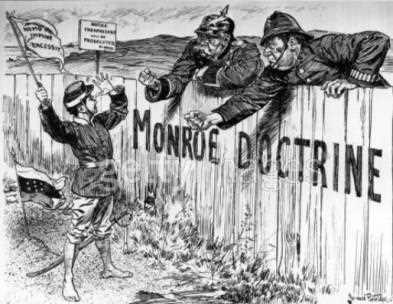On December 2, 1823, President James Monroe utilized his yearly message to Congress for a strong declaration: 'The American landmasses … are from now on not to be considered as subjects for future colonization by any European forces.' Along with such different articulations as George Washington's Farewell Address and John Hay's Open Door notes in regards to China, this 'Monroe Doctrine' turned into a foundation of American remote strategy. Secretary of State John Quincy Adams had assumed the most essential part in building up the wording of the announcement, and he likewise impacted the tenet's general shape.

Two things had been highest in the brains of Adams and Monroe. In 1821 the Russian despot had announced that all the region north of the fifty-first parallel and broadening one hundred miles into the Pacific would be beyond reach to non-Russians. Adams had declined to acknowledge this claim, and he told the Russian clergyman that the United States would protect the rule that the 'American landmasses are never again subjects of any new European pioneer foundations.'
More troubling, be that as it may, was the circumstance in Central and South America. Upheavals against Spanish manage had been in progress for quite a while, however it appeared to be conceivable that Spain and France may try to reassert European administer in those districts. The British, in the mean time, were occupied with guaranteeing the downfall of Spanish imperialism, with all the exchange limitations that Spanish administer included. English remote secretary George Canning formally proposed, along these lines, that London and Washington join on a joint cautioning against intercession in Latin America. At the point when the Monroe bureau talked about the thought, Adams restricted it, contending that British interests directed such a strategy in any occasion, and that Canning's proposition additionally called upon the two forces to revoke any goal of attaching such territories as Cuba and Texas. For what reason should the United States, he asked, show up as a cockboat trailing in the wake of a British battleship?
Secretary of State William H. Seward endeavored an unusual utilization of the precept in 1861 with expectations of maintaining a strategic distance from the Civil War. The United States, said Seward, so as to redirect consideration from the looming emergency, should challenge assumed European intercessions in the Western Hemisphere by propelling a drive to free Cuba and end the last remnants of imperialism in the Americas. President Lincoln turned down the thought.
In the 1890s, the United States, by and by one-sided activity, stretched out the precept to incorporate the privilege to choose how a debate amongst Venezuela and Great Britain over the limits of British Guiana ought to be settled. Secretary of State Richard Olney told the British, 'Today the United States is for all intents and purposes sovereign on this mainland and its fiat is law upon the subjects to which it limits its intervention… . its boundless assets joined with its disconnected position render it ace of the circumstance and for all intents and purposes resistant as against any or every single other power.' The British, grieved by the ascent of Germany and Japan, could just assent in American claims. Be that as it may, Latin American countries dissented the manner by which Washington had safeguarded Venezuelan interests.
Franklin D. Roosevelt reported his aim to supplant the Big Stick with the Good Neighbor. At his bearing, for instance, the United States denied the privilege to intercede in Cuban undertakings under the Platt Amendment. In any case, it didn't surrender its maritime base in Guantenamo Bay.
"Cheers"